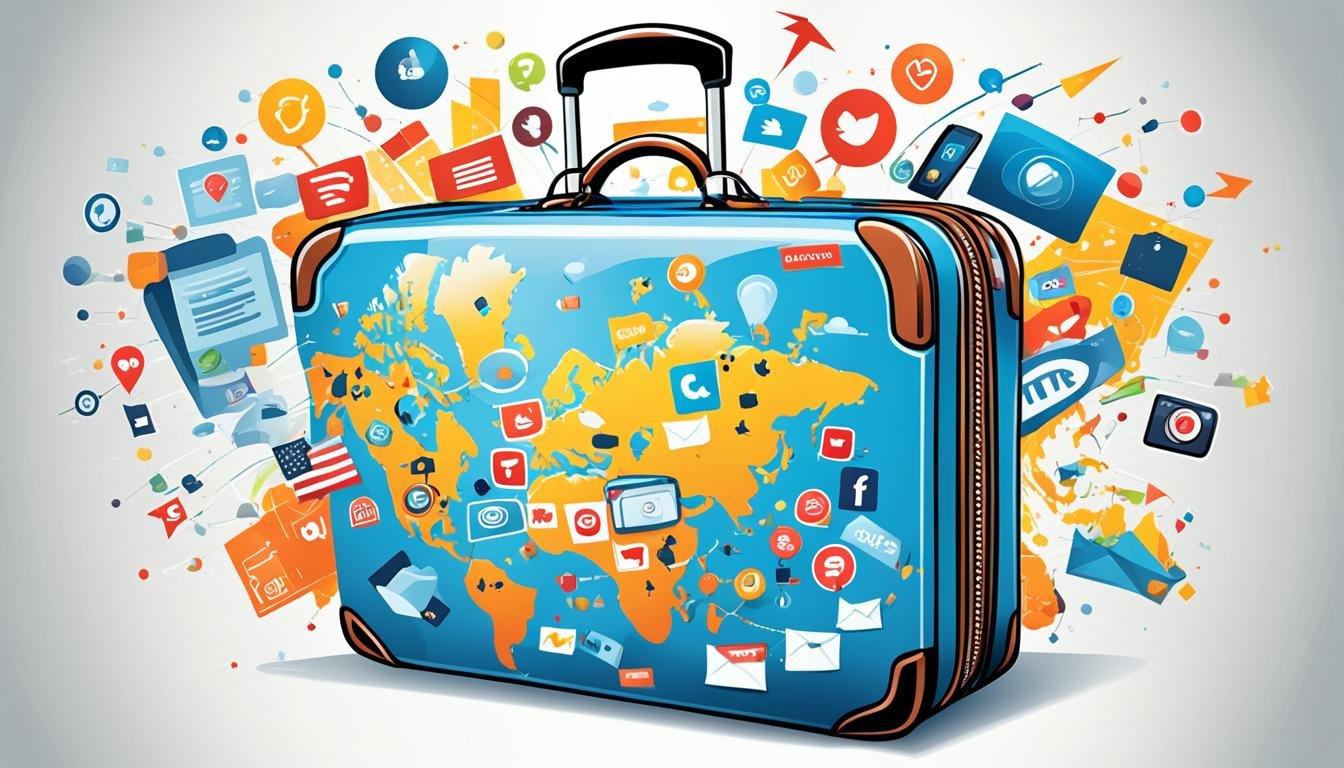Hospitality Marketing Concepts: Boost Your Business.
Ever wondered how top hotels make every stay memorable and boost their earnings? In hospitality marketing, the right tactics can change your business for the better. It’s all about making guests happy and keeping them coming back. The industry is always changing, so knowing the latest marketing ideas is a must.
This article will show you how to use hospitality marketing to improve your business. We’ll talk about how to make guests happy and keep them loyal. We’ll also look at how digital marketing can help you grow.
Key Takeaways
- Understanding hospitality marketing concepts is key to business growth.
- Digital marketing strategies help enhance customer satisfaction and loyalty.
- Emphasizing guest experience can lead to repeat business and increased revenue.
- Staying updated with industry trends is essential for competitive advantage.
- Effective reputation management can significantly impact a hotel’s brand perception.
Understanding Hospitality Marketing
The hospitality industry offers many services that focus on making customers happy. It’s different from other areas because it aims to create lasting memories for guests. This approach boosts customer satisfaction and keeps them coming back.
Market research is key in finding out what customers want and like. By knowing who they are, businesses can make marketing plans that hit the mark. For example, the hospitality industry is expected to grow to $5,297.78 billion by 2025, showing a big chance for companies to improve their marketing.
Key traits of hospitality marketing include:
- Intangibility – Services can’t be touched or seen.
- Inseparability – Making and enjoying the service happen at the same time.
- Perishability – Services can’t be saved for later.
- Variability – Every customer’s experience can be different.
Social media is now a big deal for reaching people. It’s important to keep your brand visible online. With 71% of Amazon shoppers planning to travel soon, there’s a great chance to connect with them through marketing.
| Statistic | Insight |
|---|---|
| 40% increase in gross bookings growth for global online travel agencies in 2022 | Shows more people are using digital tools to plan trips. |
| 67% of US adults feel comfortable dining out | Points to a comeback in eating out as people feel safer. |
| 60% of consumers willing to spend more for sustainable travel | Points to a growing interest in eco-friendly travel. |
| 68% of consumers lookup activities on their phones | Highlights how mobile devices are key in planning trips. |
Understanding hospitality marketing helps with keeping customers engaged and loyal. This is crucial for success in a competitive field.
Key Trends in the Hospitality Industry
The hospitality industry is changing fast, especially since travel started coming back after the pandemic. Now, travel spending is going up, showing a big change in what customers expect. Most travelers now want unique experiences, moving away from the usual.
Businesses can benefit from these hospitality industry trends. By offering custom packages, they can make more money by about 49.8% per guest. This means moving away from the old way of doing things to meet what each person likes.
Social media has become a big deal for reaching out to customers. Now, 41% of people find new products through these platforms. So, having a strong online presence is key. Using short videos and real content on sites like Instagram and TikTok helps get noticed and connect with guests.
| Trend | Statistic |
|---|---|
| Traveler Customization Expectation | 90% of travelers seek personalization |
| Revenue Increase from Personalization | Average 49.8% increase per guest |
| Importance of Social Media | 41% discover new products via social media |
| Video Content Popularity | Short videos are gaining traction |
Dealing with customer expectations means tackling staffing issues too, as over 80% of hotels are short on staff. Finding new ways to hire is key. Also, using AI tools can help with marketing and improve how a business is seen by others.
Being green is now a big deal for travelers, with 90% looking for eco-friendly choices. Hotels need to get on board with sustainable practices to keep up. Keeping up with these trends is crucial for businesses to do well in a changing market.
Benefits of Digital Marketing Strategies
In today’s world, having a strong online presence is key for hotels. With over 60% of people using the internet, hotels need to be online to connect with customers and get more bookings.
The pandemic hit the tourism industry hard, costing $935 billion. A strong digital strategy helps hotels bounce back. Using SEO and content marketing lets hotels talk to customers better and reach more people.
- Precision Targeting: Digital marketing helps hotels find and talk to the right people.
- Cost-Effective Solutions: Social media like Facebook, Instagram, and TikTok are cheap ways to reach guests who might not know about your hotel.
- Measurable Outcomes: Digital campaigns let hotels track results and improve their plans.
Content marketing is key for engaging with guests and making them loyal. Sharing useful info makes guests want to book with you. TikTok, with 689 million users, shows how important creative content is for reaching young people.
Using digital marketing opens up more chances for visibility, better customer interaction, and more online bookings. As the industry changes, using these strategies is a way to stay ahead in hospitality.
Hospitality Marketing Concepts to Enhance Customer Experience
Creating delightful customer experiences is key in modern hospitality marketing. With 93% of consumers looking at online reviews before buying, it’s clear how important it is to improve customer experiences. Offering personalized service is crucial for higher satisfaction and loyalty.
Using technology can change how customers interact with your business. Making booking easy is important because small problems can stop people from coming. Tools like Podium Reviews help get feedback and fix service gaps. Training staff well helps them give great service, making guests remember their stay.
Unique local experiences can make customers happier. These experiences help guests enjoy their stay and support local businesses. Good amenities make a stay better, leading to more repeat guests. Keeping health and safety top of mind builds trust with customers.
Having a strong online presence is important for hotels. Sites like Instagram let guests share their experiences, showing what you offer. Tailored marketing for different groups, like tourists or business travelers, makes your marketing more effective.
The following table outlines various hospitality marketing concepts alongside their impact on customer experiences:
| Marketing Concept | Impact on Customer Experience |
|---|---|
| Personalized Service | Increases customer satisfaction and loyalty. |
| Seamless Booking Processes | Encourages conversions and minimizes cancellations. |
| User-Generated Content | Affects potential customers’ perceptions positively. |
| Staff Training | Enhances service quality and customer engagement. |
| Local Experience Offerings | Boosts customer satisfaction and community connection. |
| Mobile Optimization | Improves booking convenience, especially for mobile users. |
By focusing on these areas, hospitality businesses can make customer experiences better. This leads to long-term success in a tough market.
Online Reputation Management for Hotels
Managing a hotel’s online reputation is key to shaping what customers think and keeping them coming back. With 81% of customers checking out reviews online before booking, having a plan is a must. By handling customer feedback and interacting with reviews, hotels can connect better with potential guests.
Remember, 94% of customers won’t even consider a company with bad reviews. This shows how crucial it is to quickly and positively address negative comments. By replying to reviews, hotels show they care about all customers, not just the happy ones, which builds trust.
It’s clear that 52% of travelers won’t book a hotel without reading reviews. And an impressive 84% trust online reviews as much as personal advice. This means hotels need to actively share customer feedback. By doing so, they can reduce negative feedback and get more visibility online, which brings in more guests.
To show how important online reputation management is, let’s look at some key stats:
| Statistic | Percentage |
|---|---|
| Customers searching online reviews before booking | 81% |
| Trustworthiness of online reviews vs. personal recommendations | 84% |
| Travelers reading reviews before selecting accommodations | 72% |
| Travelers scanning feedback before booking | 95% |
| Feedback read by travelers that is positive | 57% |
Keeping up with online reputation management helps hotels use performance data and customer feelings to shape their marketing. Tools like TrustYou Analytics let hotels keep an eye on feedback, track important numbers, and respond to what customers are saying. This active approach boosts sales and keeps customers loyal.
In today’s competitive hotel world, having a solid online reputation is crucial. By always listening to customer feedback and managing their online image, hotels can get ahead and build strong relationships with guests.
Effective Hospitality Branding Techniques
Branding in the hospitality industry is key to creating a unique identity that connects with guests. It shapes how customers see the brand. A strong brand builds emotional ties with guests and sets it apart from others.
- Storytelling: A great brand story shares the hotel’s values and mission, drawing in customers.
- Consistent Messaging: Every part of the brand, from ads to customer service, should share the same message. This builds trust and recognition.
- Memorable Experiences: Unique experiences that match the brand make guests more loyal and happy.
Wyndham Garden Hotels is a great example of successful branding. They use “by Wyndham” to unite under one brand, boosting their value and leading in hospitality worldwide.
InterContinental Hotels Group also shows the power of branding. They made $1.39 billion in 2021, proving a strong brand can draw in customers and increase revenue.
| Branding Technique | Description | Impact on Customer Perception |
|---|---|---|
| Storytelling | Engaging narratives that reflect brand values. | Builds emotional connections with guests. |
| Consistent Messaging | Uniform branding across all customer touchpoints. | Enhances brand recognition and trust. |
| Memorable Experiences | Unique offerings that resonate with guests. | Fosters guest loyalty and satisfaction. |
The Ritz London shows how luxury and a clear brand identity keep customers coming back. The Dome Hotel & Spa in Austria boosted its brand through smart rebranding.
As hotels change, using effective branding is crucial. It helps stand out from Airbnb and VRBO and keeps customers loyal in a tough market.
Social Media Engagement in Hospitality
Social media is a powerful tool for the hospitality industry to connect with customers. People spend about 2 hours and 28 minutes daily on these platforms. This time can be used to share engaging content and increase visibility and bookings. In fact, 75% of travelers get inspired to visit places through social media.
There are many ways to boost engagement, like running contests or sharing content made by users. For example, the #Allyouwishfor2023 contest by Accor Live Limitless (ALL) was a hit. It shows how creative campaigns can grab attention and build loyalty. Hotels can see a 15% increase in bookings with great photos on their social media.
Using videos is another great way to engage people. 66% of people find videos the most engaging. Hotels that use videos and images in their marketing tend to have better customer interactions.
Working with micro-influencers is also a smart move. They have a small but loyal following. This can help spread the word about your hotel more effectively.
| Social Media Platform | Monthly Active Users | Engagement Opportunities |
|---|---|---|
| 3.03 billion | Brand storytelling, customer service | |
| YouTube | 2.49 billion | Video marketing, tutorials |
| 2 billion | Travel inspiration, photo contests | |
| TikTok | 1.2 billion | Short-form videos, challenges |
| Snapchat | 750 million | Diverse messaging, real-time engagement |
Using these strategies can help hospitality businesses improve their brand and connect with customers on a deeper level. This leads to more loyalty and engagement.
Loyalty Programs in Hospitality Marketing
Loyalty programs are key in hospitality marketing, helping hotels keep customers coming back. They offer many benefits to both hotels and guests, building strong relationships. For example, HMC works with over 1,250 top hotels, showing how loyalty programs improve guest experiences with special rewards.
The CLUBHOTEL program reaches over 720 luxury hotels in 52 countries and 447 cities. This shows how a good loyalty program can draw in more guests. VOILÀ Hotel Rewards connects over 25 global hotel brands, proving loyalty programs help guests return.
Loyalty programs bring big rewards. A study by Harvard Business Review found that keeping an old customer costs less than getting a new one. This shows how important it is to keep customers happy. Just a 5% increase in keeping customers can boost profits by 25% to 95%.
Good loyalty programs sort guests by how often they visit or how much they spend. This lets hotels offer special perks like free nights or early check-ins. Many programs let guests earn points for things like airline miles or gift cards, making them more appealing.
For loyalty programs to work well, hotels need to set clear goals, offer personalized rewards, and make it easy to use points. With 30 years of experience, HMC shows that well-planned loyalty programs boost customer satisfaction and keep them coming back. By focusing on personal services, hotels can become top choices in a crowded market.
Customer Experience Optimization in Hospitality
In the competitive world of hospitality, making customers happy is key to success. Using targeted ads, social media, and personalized emails grabs attention before guests arrive. This approach not only makes guests happier but also helps get more bookings.
A website that’s easy to use on phones makes booking simple and quick. This makes guests excited for their stay. Adding things like mobile check-ins and keyless entry makes guests feel special and saves time.
Good communication is crucial for great service. Using apps or texts to talk to guests during their stay can make them happier. After their stay, sending surveys and personalized messages can make them want to come back.
Studies show that 72% of customers might switch brands after a bad experience. So, keeping up high standards is very important. The Customer Lifetime Value shows how strong the bond with customers is and how much money they can bring in over time.
Improving customer experience is tough, as one bad experience can take 12 good ones to fix. Most unhappy customers tell others about their bad experiences. This shows how important it is for hotels to listen to feedback well.
Strong customer service can make guests come back or look elsewhere. In short, focusing on making guests happy and giving them personalized service is key. This builds trust and gives hotels an edge in the market.
| Customer Experience Factors | Importance | Impact on Revenue |
|---|---|---|
| Personalized Communication | High | Enhances guest loyalty |
| Mobile Check-In | Medium | Streamlined arrival process |
| Feedback Analysis | High | Improves services offered |
| Effortless Booking Process | Critical | Increases bookings |
| Guest Data Activation | High | Boosts targeted marketing efforts |
Email Marketing for Hospitality Businesses
Email marketing is key for hotels to talk directly to their guests. It lets them share promotional offers and special content. This method has a big return on investment, with a 4400% return.
Personalized emails can really help get more guests to book. Adding special deals makes guests want to come back. Sending emails to the right people makes them more likely to open them.
Welcome emails are important for building a good relationship with guests. They make guests feel special from the start. Emails about seasonal deals can get more bookings during holidays.
Also, loyalty program emails give special rewards, keeping customers coming back. It’s important to know what guests like. Asking guests for their opinions helps hotels improve.
About 81% of guests are okay with giving their email when booking or checking in. This is a great way to grow your email list.
The following table shows how different strategies can help with email marketing in hotels:
| Strategy | Impact |
|---|---|
| Personalization | Increases click-through rates by up to 14% |
| Segmentation | Boosts engagement and open rates significantly |
| Welcome Emails | Enhances customer loyalty and initial impression |
| Loyalty Program Communications | Retains customers by offering special incentives |
| Feedback Solicitation | Improves services based on customer preferences |
It’s important to follow the rules about privacy. Make sure to have an unsubscribe link and remove people from your list if they ask. This keeps guests happy and avoids spam complaints.
Hospitality Marketing Concepts: Building Your Strategy
Creating a strong hospitality marketing strategy starts with knowing the market. It’s key to do deep market research to spot what consumers like. This helps in making plans that speak to your audience.
It’s vital to look at different data to understand the market. Here are some key stats about the hospitality industry:
| Statistic | Detail |
|---|---|
| Global Market Size | Nearly US$4.7 trillion in 2023, projected to grow to US$5.8 trillion by 2027 |
| 5-Star Hotel Revenue Growth | Revenue surged by 168% post-pandemic |
| Online Booking Trend | Almost 60% of hotel bookings are made online |
| Impact of Quality Photos | Quality photos can increase conversion rates by 15% |
| Social Media Usage | 55% of users consult Facebook pages for hotel information |
| Consumer Video Preference | 72% prefer learning about services via video |
| Effects of Online Reviews | Reviews greatly influence consumer decisions; trust is a significant factor |
Using programs like the Hospitality and Marketing Symposium can help. This program offers live sessions with experts on key topics. It gives attendees a lot of knowledge and insights into the market.
A good hospitality marketing strategy needs ongoing learning and adapting. By using new ideas and market research, businesses can stay ahead in a changing market.
Integrating Digital Marketing Strategies for Hotels
For hotels, blending digital marketing strategies is key to a strong marketing plan. Today, using different platforms like websites, social media, email, and ads is crucial. It helps reach more people and work better.
Having one brand message on all platforms builds trust with potential guests. With more people using mobiles to search for hotels, being easy to find online is vital. Mobile searches for travel have doubled, showing how consumer habits are changing.
Hotels should aim to get more direct bookings to increase revenue. Using strategies like setting equal rates, using metasearch, SEO, and personalized offers can help. Independent hotels should use a mix of direct and online booking to show off what makes them special.
Doing a SWOT analysis helps hotels make better decisions and understand their local markets. Email marketing is also a powerful tool. Sending emails 12 days before arrival can get a lot of people to book. Sending emails at certain times, like midday to 2 PM, can get even more people to click.
Using different digital marketing strategies can really boost how engaged customers are. This leads to more bookings and higher revenue. By using these strategies and always improving, hotels can make guests happier and more loyal. This is key to doing well in a tough market.
| Strategy | Description | Benefits |
|---|---|---|
| Rate Parity | Maintaining consistent pricing across all platforms. | Builds trust and encourages direct bookings. |
| Metasearch | Utilizing comparison sites to increase visibility. | Increases reach and attracts diverse guests. |
| SEO | Optimizing website content for search engines. | Enhances online visibility and attracts organic traffic. |
| Email Marketing | Targeted campaigns to engage existing and potential guests. | Increases direct communication and booking conversions. |
| Personalized Offers | Customizing deals based on guest preferences. | Improves guest experiences and increases loyalty. |
Conclusion
Looking into hospitality marketing, we see key strategies that boost business growth. Digital marketing has grown by 234% in five years, showing a big change. Hotels now focus more on online to connect with customers.
Using services that match customer needs has led to a 76% increase in customer interactions. This shows how important it is to know what different customers want.
Also, using strong Customer Relationship Management (CRM) systems helps keep customers coming back by 40%. This keeps guests engaged with hotels. Creative ways to show what a brand stands for also help increase profits by 68%. This shows how important branding is in the hotel industry.
In the end, being innovative and adaptable in marketing is key. By focusing on the 8 Ps of services marketing and making the customer experience better, hotels can meet and beat guest expectations. This leads to big growth for the business. Let these tips help you stay ahead in the changing hotel industry.
Source Links
- Client Testimonials | Hospitality Marketing Concepts
- Hospitality marketing – Definition, tips, trends and examples
- Hospitality marketing: Solutions and strategy for hotels – SiteMinder
- 13 Hotel Marketing Trends for 2024
- Hospitality Marketing: 17 Must-Know Upcoming Trends for 2024
- Hospitality Industry Trends (2024 update)
- Digital marketing for hotels: Complete guide | SiteMinder
- Hospitality digital marketing
- 10 Tips to Improve Hospitality Customer Experience in 2024
- Hotel Marketing Strategies and Ideas in 2024: The Complete Guide
- Hospitality Marketing: 7 Strategies to Increase Bookings
- Online Reputation Management: A Comprehensive Guide for Hotels
- Online Reputation Management for Hotels: A Complete Guide
- Hospitality Branding: Building an Effective Strategy in 2023
- 5 Marketing Strategies for Hospitality and Tourism
- 11 Effective Social Media Marketing Strategies for Hotels
- 12 ways to elevate your hotel’s social media marketing strategy in 2024
- The Effects of social media networks in the hospitality industry
- Best hotel loyalty programs and how to set up your own
- Digital Marketing in Hospitality: Elevating the Guest Experience
- Customer Experience Optimization: Best Practices, Tools, and Trends
- Customer Experience Optimization (Steps + FAQs)
- Email Marketing for the Hospitality Industry
- Hospitality Email Marketing Tips to Implement Now | Part One – PlusROI
- How to effectively use email marketing in hospitality in 2024
- Strategic Hospitality Marketing – eCornell
- Hospitality Marketing Strategies
- The Ultimate 2024 Guide to Hotel Marketing – Digital & GDS
- 11 Hotel Digital Marketing Strategies to Maximize Your Bookings in 2024
- 10 Hotel Digital Marketing Strategies to Be Ahead of the Curve
- Hospitality marketing concepts







